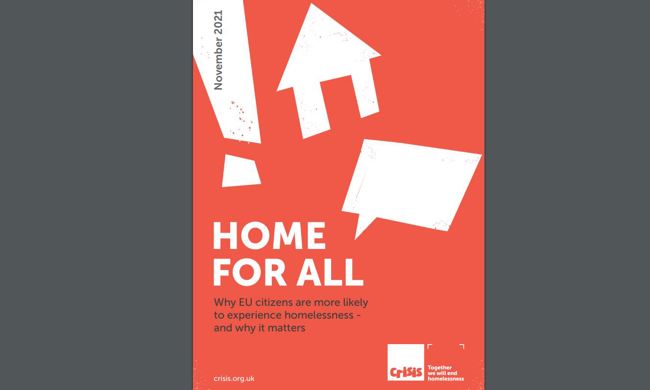The scale, causes, and impacts of homelessness among EEA Citizens
09.11.2021
Over the past decade, the scale of homelessness and housing difficulties among EEA citizens across the UK has become a growing concern. These concerns have been exacerbated by the twin challenges of Covid-19 and the end of EU free movement rules. As a society, we must make sure that everyone can access help to prevent or resolve their homelessness, regardless of where they are from. This research shows this is not the case for far too many EEA citizens living in the UK. The accompanying policy report sets out a bold new vision that ensures everyone experiencing homelessness has a route to move into safe and stable housing.
Key findings
- EEA citizens living in Britain are almost twice as likely to experience the worst forms of homelessness in comparison to the general adult population.
- Around 22,000 EEA national households were experiencing core homelessness in Great Britain at a point in time in the period preceding the Covid pandemic. This was about 9.3% of the national total of core homelessness.
- Indicative modelling over the pandemic period shows a slight decrease in the scale of core homelessness among EEA citizens to an estimated 20,500 households following the trends of core homelessness overall.
- The causes of homelessness for EEA citizens include a combination of structural factors, like employment conditions and housing supply, individual and relational factors, such as relationship breakdown, and systemic barriers that prevented people from accessing sufficient support.
- Losing a job, struggling to find secure and adequately paid work and a lack of income were all critical factors in the situation of EEA nationals experiencing rough sleeping and other forms of homelessness.
- A third of people who had recently experienced rough sleeping and a quarter of those who had experienced other forms of homelessness were unemployed before the Covid-19 pandemic, and these proportions rose substantially when the pandemic hit.
- Many participants in the research had experiences of insecure and exploitative work and reported not being paid enough to live on or, in some cases, not being paid at all.
- While many of the individual factors that triggered people’s homelessness at least partially mirror those experienced by the general population, they are compounded by a further set of factors based on the barriers individuals faced to accessing sufficient support. In many cases, participants who faced a loss of employment and challenging financial circumstances were left without an adequate safety net, which worsened and prolonged their housing difficulties.
- Crisis believes that no-one should be homeless as a result of their immigration status, yet non-UK nationals experiencing homelessness face all the dangers that people from the UK face and more.
- That is why are calling on the Government to invest in a bespoke package of specialist housing and employment support for EU citizens who face barriers to accessing support, in order to address the additional barriers that this group face to leaving homelessness behind for good.
References
Bramley, G., Morris, M., Mort, L., Netto, G., Sosenko, F., and Webb, J. (2021) The scale, causes, and impacts of homelessness among EEA Citizens, Heriot-Watt University and IPPR
Jacob, Ruth (2021) Home For All: Why EU citizens are more likely to experience homelessness - and why it matters, Crisis
Find out more about the impacts of homelessness.
Downloads

Home for All: Why EU citizens are more likely to experience homelessness - and why it matters (2021)
As a society, we must make sure that everyone can access help to prevent or resolve their homelessness, regardless of where they are from. Currently this is not the case for far too many EU citizens living in the UK.

The Scale, Causes and Impacts of Homelessness among EEA Citizens (2021)
This report presents new research on homelessness among EEA nationals in the UK. The research has sought to establish an estimate of the current scale of homelessness across Great Britain affecting EEA nationals, as well as the factors behind their housing circumstances and support needs.

